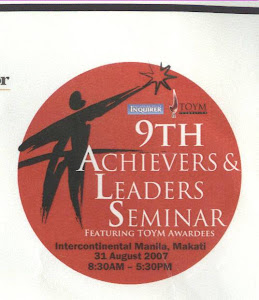It all started when I was taking research for my Masteral studies in Community Development at the University of the Philippines. Being Unat, I wanted (actually I was very excited) to do a life history of an Aeta communty organizer. My professor never knew it but one reason for that research proposal was that I was interested in one particular Aeta and I knew I'd be able to learn more about him if I did it.
To make the story short, I got a very high grade in that class, but I haven't finished my Master's until now. I got married to that Aeta and I am now a mother to an Aeta boy.
What does it mean being mother to an Aeta boy especially since I am Unat and a graduate of UP?
Well it does not really make a difference- but actually it does make a lot of difference. It means that I have to be patient at all times in explaining to people that our baby has straight hair and a morena complexion and he is an Aeta. It means that whether or not he's dressed up or if there's sand or charcoal all over his body because he loves to play with these or he wears Kimbies and not just lubay or bahag, I will keep telling anyone who asks that our baby is an Aeta.
It also meeans that I will always be thankful to our office for allowing me to breast-feed him. I cried the first time he was fed with powdered milk while I was away. Call it impulse, call it instinct, I thought I'd lose him by continuous feeding with infant formula at that age.
It means walking so many kilometers to visit his cousins and see if our communal chemical fertilizer-and-pesticide-free ricefield, which is less than a hectare, is growing well.
It means preparing his breakfast of ripe mangoes and rice (No Cerelac, please) or a lunch of kamoteng kahoy sauteed with bagoong and mixed with leaves of ligaw na ampalaya or a dinner of bulig, fresh from the sapa, na sinabawan sa tanglad.
It means teaching him how to use the spoon and fork and at the same time allowing him to learn how to feed himself. His sariling diskarte, as Tatay said, is using both hands or putting his face on his plate until his pink sando gets stained.
It means using first amapalaya juice for general welfare and hilot for pilay before going to the doctor or the pharmacy.
It means reading to him stories fit for his age before he takes a nap in the morning, and worrying what to read to him next because what we have are Reader's Digest and newspapers. Pinatubo Aetas and the like have no budget for books that he would need as he gets older and wiser.
It means reminding him to return to their proper places Nanay's shoes or Lola's clogs after he's gotten over his anger because he can't put his right foot into the right shoe.
It means dancing with him until he gets dizzy over the new steps he's probably imitated from somewhere.
It means explaining to him Nanay's disappointment or Tatay's anger. It means letting him cry when he's hurt and teaching him to pat his playmate's back or hand when they cry.
It means showing him how Tatay washes our clothes and cooks our food and letting him listen to Tatay's and Nanay's assessments of the family, the Philippine economy or the continuing struggle of indigenous peoples.
It means wishing that someday my baby will be able to return to Pinatubo-his lupang ninuno-and help organize Aeta communities when he's more able.
But for now it simply means whispering "Mahal ka ni Tatay at ni Nanay at marami pang iba. Kaya matulog na para bukas makapaglaro muli."
--This article was published in July 1996 in the Youngblood section of the Philippine Daily Inquirer, or two years after my first son was born.
Subscribe to:
Post Comments (Atom)
.jpg)

.jpg)
No comments:
Post a Comment